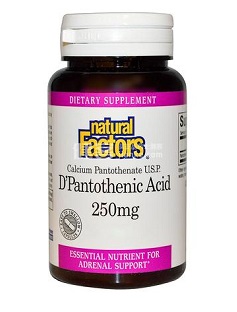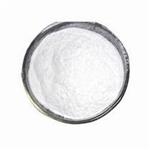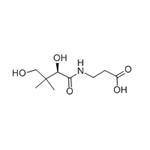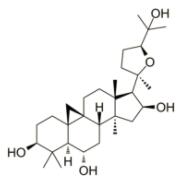Uses of Pantothenic Acid
Pantothenic acid is a vitamin, also known as vitamin B5. It is widely found in both plants and animals including meat, vegetables, cereal grains, legumes, eggs, and milk.
Vitamin B5 is commercially available as D-pantothenic acid, as well as dexpanthenol and calcium pantothenate, which are chemicals made in the lab from D-pantothenic acid.

Uses
Pantothenic acid is frequently used in combination with other B vitamins in vitamin B complex formulations. Vitamin B complex generally includes vitamin B1 (thiamine), vitamin B2 (riboflavin), vitamin B3 (niacin/niacinamide), vitamin B5 (pantothenic acid), vitamin B6 (pyridoxine), vitamin B12 (cyanocobalamin), and folic acid. However, some products do not contain all of these ingredients and some may include others, such as biotin, para-aminobenzoic acid (PABA), choline bitartrate, and inositol.
Pantothenic acid has a long list of uses, although there isn't enough scientific evidence to determine whether it is effective for most of these uses. People take pantothenic acid for treating dietary deficiencies, acne, alcoholism, allergies, baldness, asthma, attention deficit-hyperactivity disorder (ADHD), autism, burning feet syndrome, yeast infections, heart failure, carpal tunnel syndrome, breathing problems, celiac disease, colitis, pink eye (conjunctivitis), seizures, and bladder infections.
It is also taken by mouth for dandruff, depression, diabetic nerve pain, enhancing immune function, improving athletic performance, tongue infections, gray hair, headache, hyperactivity, low blood sugar, trouble sleeping (insomnia), irritability, low blood pressure, multiple sclerosis, muscular dystrophy, leg cramps associated with pregnancy or alcoholism, general nerve pain, and obesity.
Pantothenic acid is also taken by mouth for osteoarthritis, rheumatoid arthritis, Parkinson's disease, premenstrual syndrome (PMS), enlarged prostate, protection against mental and physical stress and anxiety, reducing side effects of thyroid therapy for people with decreased function of the thyroid gland, reducing signs of aging, reducing the risk of getting a cold or other infection, delayed growth, shingles, skin disorders, stimulating adrenal glands, sore mouth (stomatitis), chronic fatigue syndrome, toxicity related to medications such as salicylates or streptomycin, dizziness, constipation, and wound healing. It is also used following surgery to improve movement in the intestines and to reduce sore throat.
People apply dexpanthenol, which is made from pantothenic acid, to the skin for itching, promoting healing of mild eczemas and other skin conditions, insect stings, bites, poison ivy, diaper rash, and acne. It is also applied topically for preventing and treating skin reactions to radiation therapy. It is also applie to reduce skin reactions to radiotherapy treatment, for dry eyes and eye trauma, and for sprains.
Pantothenic acid is important for our bodies to properly use carbohydrates, proteins, and lipids and for healthy skin.
Safety concerns
Pantothenic acid is LIKELY SAFE for most people when taken by mouth in appropriate amounts. The recommended amount for adults is 5 mg per day. Even larger amounts (up to 10 grams) seem to be safe for some people. But taking larger amounts increases the chance of having side effects such as diarrhea.
Dexpanthenol, a derivative of pantothenic acid, is POSSIBLY SAFE when applied to the skin, used as a nasal spray, or injected as a shot into the muscle appropriately, short-term.
Special precautions & warnings
Pregnancy and breast-feeding: Pantothenic acid is LIKELY SAFE when taken by mouth in recommended amounts of 6 mg per day during pregnancy and 7 mg per day during breast-feeding. However, it is not known if taking more than this amount is safe. Avoid using larger amounts of pantothenic acid.
Children: Dexpanthenol, a derivative of pantothenic acid, is POSSIBLY SAFE for children when applied to the skin.
Hemophila: Do not take dexpanthenol, a derivative of pantothenic acid, if you have hemophila. It might increase the risk of bleeding.
Stomach blockage: Do not receive injections of dexpanthenol, a derivative of pantothenic acid, if you have a gastrointestinal blockage.
Ulcerative colitis: Use enemas containing dexpanthenol, a derivative of pantothenic acid, cautiously if you have ulcerative colitis.
You may like
Related articles And Qustion
See also
Lastest Price from D-PANTOTHENIC ACID manufacturers

US $6.00/kg2025-04-21
- CAS:
- 79-83-4
- Min. Order:
- 1kg
- Purity:
- 99%
- Supply Ability:
- 2000KG/Month

US $0.00/kg2025-04-15
- CAS:
- 79-83-4
- Min. Order:
- 25kg
- Purity:
- 99.0%
- Supply Ability:
- 10tons



